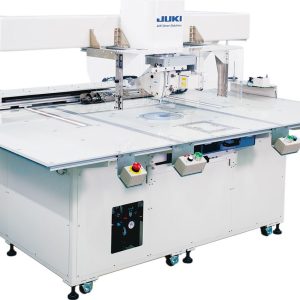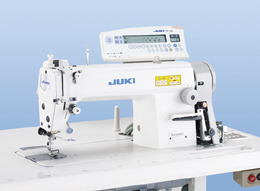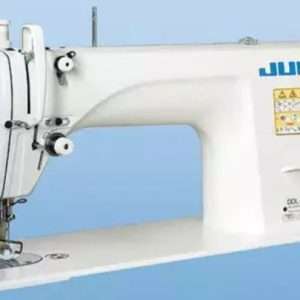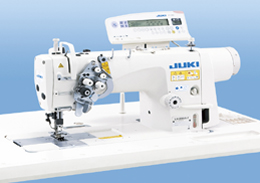X: 130mm × Y: 60mm
The sewing machine flexibly supports the sewing of small articles such as labels and emblems. The sewing machine’s small sewing area promises ease of use when handling small articles, thereby enabling smooth sewing operation.
Slide-type thread take-up lever
AMS-210EN-HL1306/7300
The machine with a slide-type thread take-up lever is designed for improved stitching with heavy thread tension. JUKI’s unique active tension mechanism which has been re-designed specifically for heavy-weight materials, as well as the slide-type thread take-up lever which is suited for sewing heavy-weight materials, increases the maximum tension by 50% more compared to that of the standard models of the JUKI AMS Series machines. The new model improves seam quality (thread tension) for sewing seat belts and general heavy-weight materials such as container belts and bags.
X: 150mm × Y: 100mm
The sewing machine flexibly supports the sewing of small articles such as labels and emblems. The sewing machine’s small sewing area promises ease of use when handling small articles, thereby enabling smooth sewing operation.
X: 220mm × Y: 100mm
This model has a sewing area that is best-suited to the sewing of large parts, including the shape-tacking of jean pockets. With this model, you may recognize the higher productivity of the cycle machine.
X: 250mm × Y: 160mm
The sewing is best-suited to the sewing or large labels and emblems, the sewing of two or more pieces of small labels and emblems at one time, and the shape-tacking of bags and shoes. The sewing machine is applicable to a broad range of materials and processes while leading the industrial machine industry in terms of improvement in quality and the promotion of production that does not require sewing-machine operators to have special skills.
X: 300mm × Y: 200mm
The sewing machine is applicable to sewing products which require a wider sewing area than that of the “AMS-221EN-2516.” It is best-suited to the attaching of the handles to bags and the shape-tacking of boots and shoes. The sewing machine is flexibly applicable to sewing requiring a medium sewing area.
The sewing machine has achieved the industry’s highest sewing speed of 2,800sti/min. The maximum sewing speed is reached by the 2nd stitch from the beginning of sewing. Since the sewing machine maintains its highest sewing speed immediately before the end of sewing and instantaneously decreases its speed, cycle time can be substantially decreased.
JUKI’s unique stepping-motor controlled thread trimming mechanism is adopted to enable speedy and consistent thread trimming performance.
The machine demonstrates enhanced responsiveness due to the adoption of a main-shaft direct-drive system.
Sewing at the maximum sewing speed of 2,800sti/min is possible up to a stitching pitch of 4mm for the AMS-210EN (the highest sewing speed and stitching pitch in the industrial sewing machine industry). Even for the larger pitches, the sewing speed is increased by 90% for the AMS-210EN and by 60% for the AMS-221EN at the maximum when compared with the conventional models, thereby reducing the cycle time.
* The sewing speed is automatically controlled according to the stitching pitch.
The AMS Series is an economically efficient model which has been designed to reduce power consumption.
The AMS-210EN is an economically efficient model which has been designed to reduce power consumption. The sewing machine has adopted a direct-drive system by means of a compact AC servomotor that is excellent in energy transmission to drive the main shaft and has adopted an encoder-control system that drives the stepping motor with a minimum of power in accordance with the material thickness and stitches length to control the X-Y drive mechanism. Power consumption of the new AMS Series is reduced by 30% when compared with JUKI’s conventional AMS-210E.
The position of the feed can be checked during sewing by means of the encoder-controlled X-Y drive stepping motor. This remarkably improves the accuracy of the feed. As a result, deformation of a sewing pattern which is likely to occur when sewing at a high speed or sewing a heavy-weight material is significantly reduced.
The frame (needle bar unit and thread take-up unit) is lubricated with grease, and the hook is fed with a minute quantity of oil from the oil tank. JUKI’s advanced dry technology, which is utilized in a number of our sewing machine models, protects your products from being stained with oil.
To support the sewing of multi-layered parts of materials, the lower dead point height of the intermediate presser can be changed with no steps needed during sewing (standard: 0~3.5mm; maximum: 0~7.0mm). The intermediate presser will now be able to clamp the material without fail, thereby preventing troubles in sewings, such as stitch skipping and thread breakage. Furthermore, flaws in the sewing product are prevented by maintaining the intermediate height as desired according to the material thickness. (The intermediate presser stroke is adjustable between 0 and 10mm.)
The feeding frame comes in two different types; the monolithic feeding frame and the separately-driven feeding frame. The separately-driven feeding frame enables easy placement of the sewing material on the machine since its right and left frame parts can be operated separately. Both the amount of lift and the ascending/descending speed of the feeding frame can be adjusted differently for the right and left parts of the frame.
The feeding frame can be lowered in two steps. It is very convenient for finely positioning the material on the sewing machine. The stopping height of the feeding frame can be set as desired with ease.
Market-proven active tension has been introduced to the needle thread tension controller. With the active tension, pinpoint changes in the needle thread tension during sewing are enabled. The needle thread tension, therefore, can be set in conjunction with the material thickness and can be corrected according to the direction of sewing on a stitch-by-stitch basis through the operation panel. Since the needle thread tension is reproducible, supporting a broader range of sewing conditions, the time required for setup changing upon process changeover can be reduced.
The machine can be used for free pattern stitching, parts sewing, reinforcement stitching, etc.
Examples of applications include the attaching of labels, emblems, and name labels, the attaching of Velcro, various shape-tacking, and special bartacking.
The large-sized liquid crystal touch panel, which has been developed to ensure ease of operation, dramatically increases efficiency in edit work.
The IP-420 touch panel offers market-proven ease of operation. It is provided with widescreen and programmable functions. Data can be input/edited while visually checking the needle movement.
The color LCD unit displays sewing data such as stitch shape, needle thread tension, enlargement/reduction ratio, sewing speed, and the number of stitches at a glance. The IP-420 is provided as standard with 14 different display languages.
Key-lock customization function
The key-lock state can be set as desired. It is therefore possible to hide items that should not be handled by the operators.
Simplified operation mode
Simplification of set items and screen transition of the IP-420 increases ease of use and helps reduce operator fatigue.
Sewing data created with the IP-420 can be stored in the memory of the main body of the sewing machine. The memory storage capacity is 500,000 stitches and 999 patterns (max. 50,000 stitches per pattern) at the maximum. In addition to the CompactFlash 33 card, the main body of the sewing machine is provided as standard with a USB connector. Now, data can be input/output to/from various kinds of media (FD (floppy disks), SM (SmartMedia), CF (CompactFlash), SD (Secure Digital Card) etc.) by means of a USB thumb device and a card reader. The maximum number of stitches that can be stored in the memory for each medium is approximately 50,000,000.
| Model | AMS-210EN-SS | AMS-210EN-HS |
|---|---|---|
| Application | Light- to medium-weight | Medium-to heavy-weight |
| Max. sewing speed | 2,800sti/min (when stitch length 4mm or less) | |
| Stitch length | 0.1~12.7mm (0.05mm step) | |
| Storage of pattern data in the memory | Main-body memory: Max. 500,000 stitches, 999 patterns (max. 50,000 stitches / patterns)External media: Max. 50,000,000 stitches, 999 patterns (max. 50,000 stitches / pattern) |
|
| Needle | DP×5 (#14) | DP×17 (#18) |





Business Hours:
Monday thru Friday:
8:00 AM – 4:30 PM
Please call for an appointment.